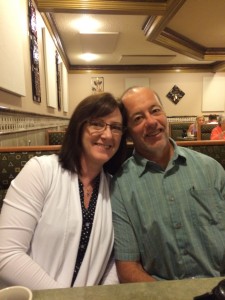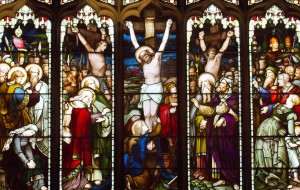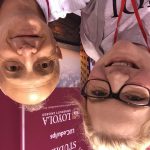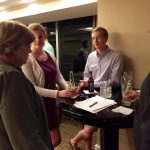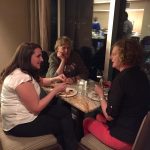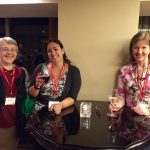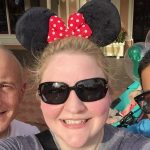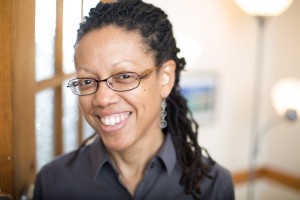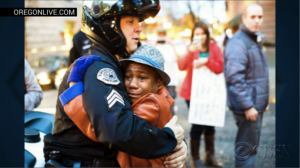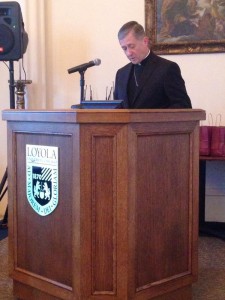IPS’s Parish Leadership and Management Programs, in conjunction with Catholic Extension, recently held the first of four “Parish Health and Wellness Ministry Certificate” weeks.
The program focuses on the under-resourced mission dioceses of Catholic Extension who can benefit the most from this intensive training week. Catholic Extension polled all their mission dioceses, asking what their needs were. The top response was the need to assist people who work in parishes where questions regarding mental and physical health are constantly occurring. This ranged from addictions, to pregnancies, to violence, to depression, to long term care for the elderly, and more.
In response to this need, Catholic Extension partnered with Loyola IPS to create a week-long training in parish heath and wellness ministry, grounded in the belief that parishes should be a place of health and wellness of the mind, body and spirit.
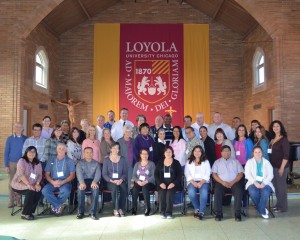
IPS’s Coordinator of Parish Leadership Management Programs Mark Bersano said the goal of this initiative is to reach out and serve parishes in innovative ways by providing the kinds of courses and trainings that are outside of the typical degree programs currently offered at IPS.
The week long event began on a Sunday evening with a mass and reception dinner. The following four days of programming consisted of prayer services, workshops, speakers, skills development and more. The week concluded on Friday morning with a sending ceremony where the participants received a certificate from IPS.

This is a 4 year program that began with the first cohort in October 2015. The following cohorts will consist of different people each year, occurring in October 2016, 2017 and 2018. By the time the program is finished, Mark said that they could have up to 200 participants, with 40-50 participants each year.
“The grant funding currently allows 4 years, but we are hoping that it will turn into something that is sort of a movement in the church. There’s hope that we will be able to work with the local Chicago parishes and partner with them to build this concept that the parish is a place of health and wellness of mind, body and spirit.”
Participants consisted of people from dioceses across the United States including: Rapid City, SD; Boise, ID; Helena, MT; Las Cruces, NV; Beaumont, TX; Charlotte, NC; Brownsville, TX; Gaylord, MI; Marquette, MI; Jefferson City, MO; Belleville, IL; and more.
Mark said, “The people who were there were all pastoral ministers in one capacity or another at either the parish or diocesan level. Many of them already had something to do with healthcare and some of them were thinking about starting new ministries or expanding ministries they already had.”
Some of the highlights from the week were Kevin O’Connor’s session “Active Listening and Issue Diagnosis,” Timone Davis’s “Theology of Baptismal Vocation & Missionary Discipleship,” Dan Rhodes’s “Theology of Service” and Anna Mayer’s “Walking with the Dear Neighbor: A Model of Accompaniment.”
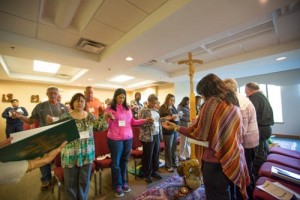
“Again, the real theme was the parish as a place of health and wellness of mind, body and spirit and also that by getting involved in these things, parishoners and people in parishes could raise up their own baptismal vocations and become missionary diciples helping others,” stressed Mark.
He gave the example of someone starting their own domestic violence ministry. Or on a very basic level, someone getting involved with elderly people in the parish who might not always remember to take their medication. Something as simple as making phone calls to remind them can make a difference.
IPS Administrative Assistant Mirta Garcia was also in attendance and helped organize and run the event. She said the week went extremely well.
“All the presenters and facilitators did a great job with their individual subjects, and with weaving each topic into the next for a seamless participant experience. It was fascinating to see how the participants became more engaged with each successive day. Seeing them make new connections and bonding with people who have similar interest and ministries was truly amazing. It was an honor to be part of this week-long intensive certification program. My favorite part was making new friends and connections with people who are passionate about their faith and ministry. I am looking forward to hearing how the participants will take everything they learned and make it blossom in their communities.”
Mark agreed, saying “people had a really good experience. They bonded extremely well. At the end of the week, they were all saying they missed their families and wanted to get home, but at the same time they didn’t want to leave. One participant even suggested having a reunion. They were there for a week and already felt that.”
Join the conversation by following @BrianSchmisek on Twitter and @LoyolaIPS on Instagram! Also, network with the Loyola Chicago IPS community on LinkedIn.
